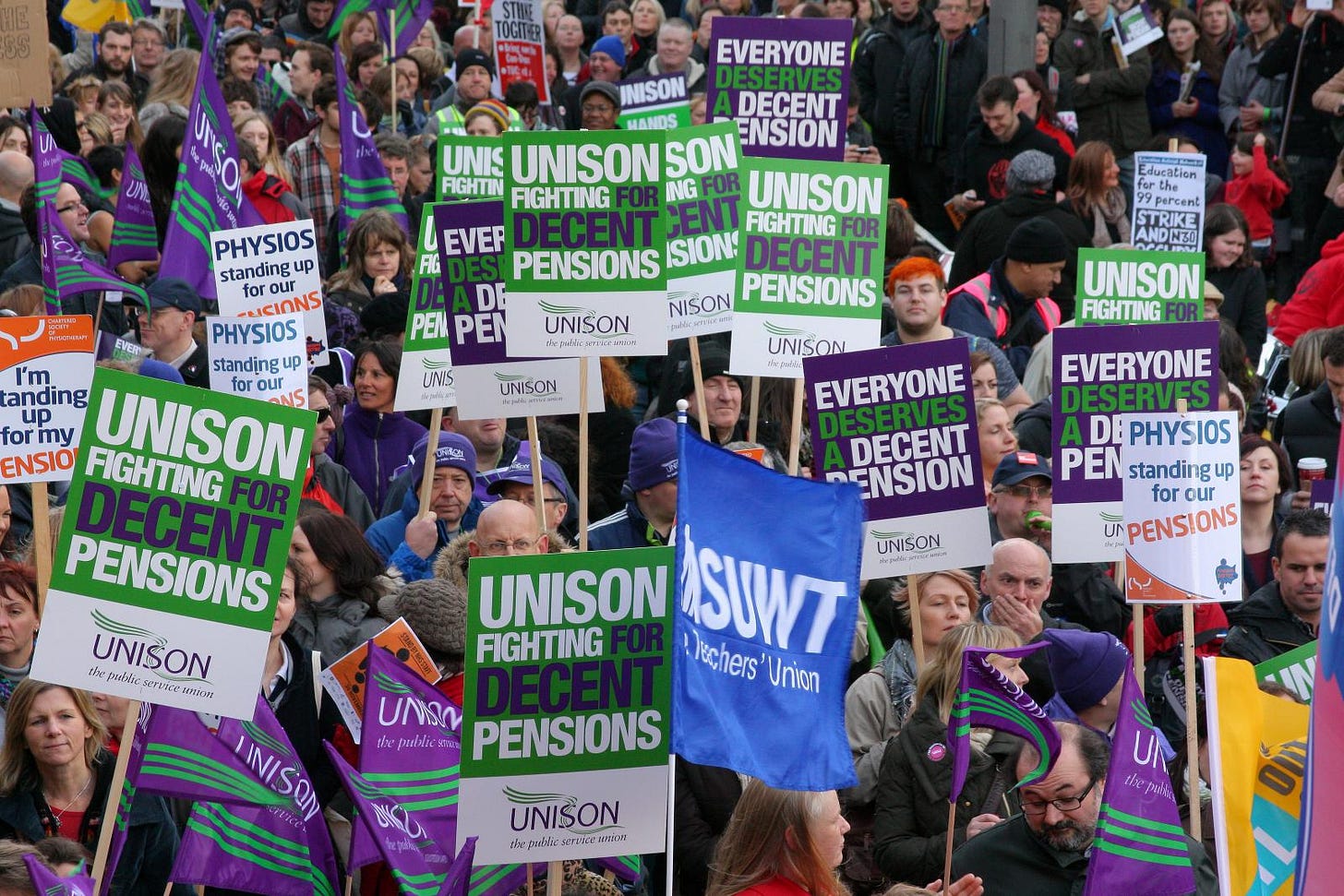The new union movement
What do recent strike ballots have to tell us about how the union movement is changing?
This is the fortnightly free version of my newsletter. Every other week I offer content to paid subscribers only. If you would like to read this newsletter weekly, I have a special offer running until the end of April with a discount if you sign up for a year.
[This post has been edited as it originally got the recommendation of Unison leadership wrong. My apologies].
Almost exactly ten years ago (actually it was, ironically the 1st May - International Workers Day) I was made redundant from the TUC.
(As an aside, please,don’t worry gentle readers! This isn’t going to become a ‘poor me they done me wrong’ newsletter, though I realise that after the last post which mentioned not getting a job elsewhere it might feel that way, actually all these things have brought me to where I am and I am really happy here.)
The reason I mention being made redundant (as part of either the second or third, and I believe not the last round of cuts from the section I worked in, so I was not alone) from the TUC is because there were several things that happened during the run up to this that worried me not just in my own case, but also about the state of the union movement back in 2013.
The biggest problem I had, was that our internal unions were, to put it bluntly, crap. Members whose jobs were in the balance, asked that we not take strike action off the table as part of the negotiations. The shop stewards point black refused to even accept this as a possibility. That removed a huge tool from our ability to negotiate - as obviously it would have been pretty embarrassing for the TUC of all organisations to have their staff go on strike. We weakened our position because “We can’t embarrass the movement.”
In the end, I got a decent payoff and found another job less than six weeks after it happened. All’s well that ends well.
But the defensiveness of the TUC’s internal unions spoke to me of a culture then that reflected some wider trends that concerned me in the movement. A sense of fear about the whole movement being under attack led to any internal dissent being silenced.
As we have seen in the ten years since, that was not good for the movement. As scandals hit the GMB, the RCN, TSSA, Unite (and these are the ones that spring to mind, there may be more) that culture of internal defensiveness has clearly been shown to be highly damaging as areas of concern that could and should have been nipped in the bud were allowed to fester until they exploded.
It feels to me like we are in a very different moment now. But I am not wholly sure the narrative about the movement has caught up.
Let’s look at two different things that I think demonstrate this.
Firstly, the Unite leadership contest of 2021. There were three candidates for General Secretary: Steve Turner - seen as the candidate of the left and Len McCluskey’s favourite to replace him; Gerard Coyne - seen as the candidate of the centre who had previously been suspended after unsuccessfully challenging McCluskey; and the eventual winner Sharon Graham.
All the fevered speculation at the time was about the first two and the psychodrama that comes when a Labour affiliated union has what is seen as a clear left/right battle. I remember texting a friend at the time that I had heard that Graham had been working the branches hard and could be an ‘interesting dark horse’ but I didn’t put her odds spectacularly high. Neither did the bookies. I checked and she was priced at 33/1 against the favourite Coyne who was at 4/1. We too were caught up in the same narrative and SW1 focus.
But Sharon did win - and by a decent margin. I can’t tell you what was in the hearts of Unite members, but it seems to me that they opted out of the pissing contest and went for the candidate that talked the most about the traditional role of unions in vigorously acting on behalf of members to improve their wages and conditions and less about the union as a political actor.
The second thing that I think is interesting when looking at how the union movement has changed is the fact that this week, in voting to accept the Government’s pay offer, RCN members went against the advice of their leadership and in voting to reject the offer.
In both of these examples - and in the responses to the litany of scandals - I think what is becoming clear is that the era of the all-powerful ‘union baron’ is over - even as we are clearly in a new age of more high profile union activity.
Union members need unions to act in their interests first and do the other bits of union activity second. Now, I am in no way saying that the day-to-day work of the vast majority of union employees wasn’t already fully focused on that. But the rhetoric coming from the top wasn’t. It was a constant stream of high-level politics - about internal Labour matters, about Brexit and other policy areas that, while the matter to all of us, are not the same as workplace organising and focusing on collective bargaining positions that achieve those wins.
I have long said that one of the reasons unions became so left wing over the last few decades were twofold.
Firstly, the movement got a lot smaller. It became a lot more concentrated in the public sector as these were the places where it was easier to build up critical mass in large organisations. As our manufacturing industry declined, the larger organisations broke up or moved abroad and smaller workplaces have always been harder to unionise - especially as the Tories pass legislation after legislation to curb union activity.
Secondly, the Labour right just stopped caring about organising within unions for too long, leaving the field free for the Labour left to do so. This happened throughout the New Labour years, and it only really caught their attention when Labour was out of government. Their response it seems, particularly looking at the Coyne Vs McCluskey and Coyne Vs Turner fights was to fight these like the politics mattered more than the union activities.
As an outsider, I think this is how Sharon Graham won. She offered the union something that wasn’t about an interminable left/right right, but something that was more practical and pragmatic - a union vs exploiting in the workplace stance. That isn’t to say she isn’t on the left - she clearly is. But that wasn’t the stance from which she chose to fight - and ultimately win - this battle.
Union members seem to have become significantly less biddable. That two unions have found their members have rejected the advice of their leadership over one particular strike is an interesting development.
As this new generation of union leaders find their feet, I think we are looking at unionism being in a different and more powerful place than it has been for several years. But I think what has happened this week is a reminder that this power doesn’t come from the top. It comes from union members.
I run a political and communications consultancy called Political Human. Please get in touch if you are looking for political or media consultancy advice, strategic communication and campaign planning, ghostwriting, copywriting, editing, training or coaching.
You can read some lovely things that some of my clients have said here.
What I’ve been up to
No episodes of House of Comments during recess, but we have recorded an episode of The Zeitgeist Tapes, where Professor Steve Fielding and I discuss the politics of My Fair Lady - a film I found baffling.
I also went to se SAP at Soho Theatre which I thought was excellent. I would highly recommend it.
A final appeal. This newsletter takes quite a while to think about and write. I know things are really tough all over at the moment and not everyone will want to subscribe to the paid editions, but if you can spare some cash to say you’ve appreciated it, I can’t tell you how much that would mean to me right now.
Questions, comments and arguments are very welcome. Insults will get you summarily blocked on every platform. I’m at emmaburnell@gmail.com or on Twitter at @EmmaBurnell_.



